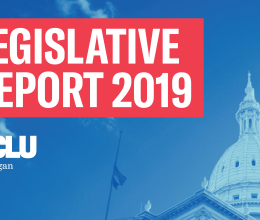
DETROIT – The American Civil Liberties Union of Michigan announced its full support for the "employee protection privacy act," new legislation introduced in the Michigan Senate today. The act would prohibit employers from invading the privacy of applicants or employees outside of the work environment.
“This should not be mistaken as a smokers' rights issue; rather, as a true privacy issue,” said Kary Moss, ACLU of Michigan Executive Director. “Employers should not be able to punish their employees for their legal, at-home behaviors.”
“Any attempt to control off-duty behavior poses a threat to personal privacy and autonomy,” added Moss.
The need for this new legislation, Senate Bill 381, was sparked by the case of a Michigan company who fired several employees when they refused to submit to a tobacco test under a no-smoking-anywhere policy that became effective on January 1, 2005. Other employers in the state have since instituted similar restrictions.
Americans have long accepted that employers have a certain degree of control over what behaviors can be engaged in while at the workplace. But increasing numbers of employers are dangerously broadening the sphere of their control to include what employees do in their own homes. The ACLU does not oppose smoking bans in public buildings, in the workplace, or in other locations where non-smokers may be subjected to second-hand smoke.
Neither state law, Title VII, nor the Americans With Disabilities Act offer privacy protections, especially in the private sector, from restrictions placed on a worker by their employers. Twenty-one states have passed lifestyle discrimination statutes. The majority of these protect only smokers, but a few are broader. Colorado and North Dakota ban discrimination based on any form of legal off-duty behavior.
The intent of the Michigan bill is to provide broad protections and specifically protects employees engaged in “ any lawful activity that is both off the employers premises and during non-work hours.”
A third of the Michigan Senate has already co-sponsored SB 381 and the legislation is receiving strong bi-partisan support.

